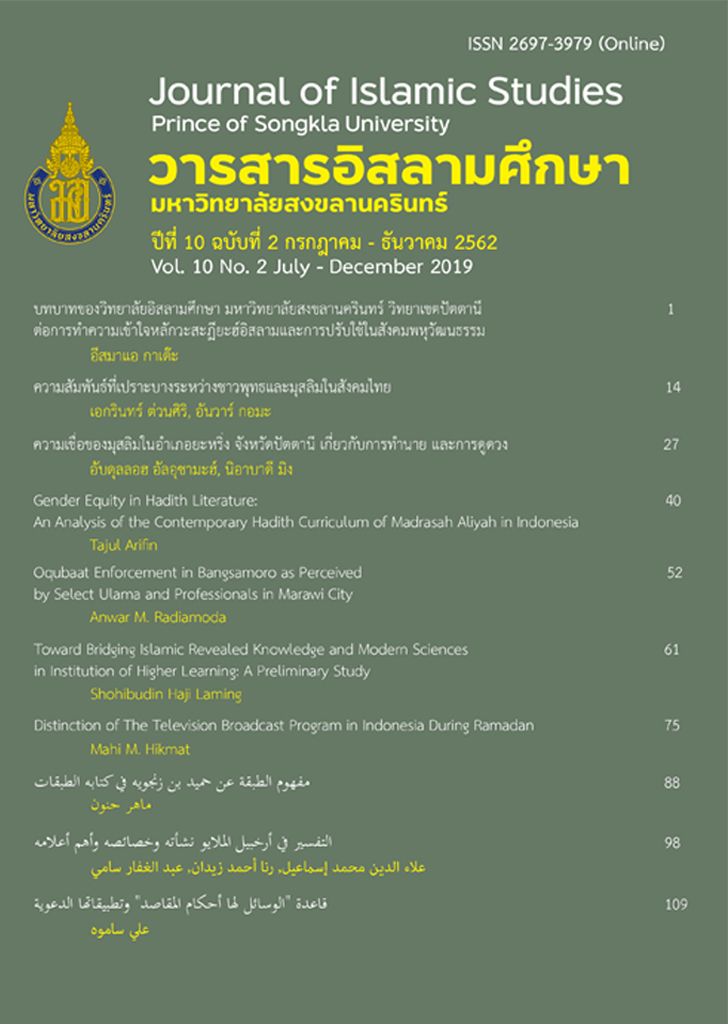The Fragile Relationships between Buddhists and Muslims in Thai Society
Keywords:
Buddhist-Muslim relations, Fragility, Islamophobia in ThailandAbstract
This study attempts to examine ontology of Buddhist-Muslim relations in Thai society between 2018-2019. A focus group and in-depth interview were used to collect data from 4 regions of the country between July-December 2018. It demonstrates that the tensions between Buddhists and Muslims in the society can be seen as a challenge of the 2010s, which needs to be monitored systematically. Such relations had been socially constructed through interactions between the compatriots of different religions and ethnicities and can be changed over times and over places, from cooperation to confrontation and violence. In this decade, such relations, however, has changed in a negative way. Examples are a change of direction from vertical violence to horizontal conflict in the far south, active protests of Buddhists against Muslims in the North and Northeast, and an increased visibility of Muslim identity in upper South and the Central. This research study explains why such relations turned more fragile, which areas are the most dangerous, and how is the conflict relevant to different types of area.
References
นาถจำนง, ทองแถม. (2016). มุสลิมในอาณาจักรอยุธยา : ถิ่นฐาน. สยามรัฐ, 5 October 2016. สืบค้นจาก https://siamrath.co.th/n/3704.
นิธิ เอียวศรีวงศ์. (2017). นิธิ เอียวศรีวงศ์. ความแปลกหน้าของมุสลิม. มติชนสุดสัปดาห์ (blog). สืบค้นจาก https://www.matichonweekly.com/column/article_57152.
———. (2017). นิธิ เอียวศรีวงศ์ : ความแปลกหน้าของมุสลิม (จบ). มติชนสุดสัปดาห์ (blog), 13 October 2017. สืบค้นจาก https://www.matichonweekly.com/column/article_58920.
ผกาวดี สุพรรณจิตวนา. (2561). ความไม่คุ้นเคยกับการต่อต้านการสร้างมัสยิดในพื้นที่ภาคเหนือของไทย’. สงขลานครินทร์ ฉบับสังคมศาสตร์และมนุษยศาสตร์ 24, (2), 3–33.
เสาวนีย์ จิตต์หมวด. (2531). กลุ่มชาติพันธุ์: ชาวไทยมุสลิม. กรุงเทพฯ: กองทุนสง่ารุจิระอัมพร,
อาลี เสือสมิง. )2553). ‘โต้ตอบหนังสือ ตาลาติ๊ต่ำปง (ภาคที่ ๑). สืบค้นจาก http://alisuasaming.org/main/?p=1042.
เอกรินทร์ ต่วนศิริ. (2015). โลกทัศน์ของปัญญาชนมุสลิมกับประชาธิปไตย. วารสารสงขลานครินทร์ ฉบับสังคมศาสตร์และมนุษยศาสตร์ 21, (3), 87–124.
เอกรินทร์ ต่วนศิริ. (2553). การเมืองแห่งอัตลักษณ์: ความหลากหลายและพลวัตของมลายูมุสลิมปัตตานีในจังหวัดชายแดนใต้. กรุงเทพ:จุฬาลงกรณ์มหาวิทยาลัย,
Anderson, Benedict. (2006). Imagined Communities: Reflections on the Origin and Spread of Nationalism, Revised Edition. London: Verso.
Beyrer, C. & Kamarulzaman, A. (2017). Ethnic Cleansing in Myanmar: The Rohingya Crisis and Human Rights. The Lancet, Retrieved from https://doi.org/10.1016/S0140-6736(17)32519-9.
Imtiyaz, Y. (2007). Faces of Islam in Southern Thailand. East-West Center Washington Working Papers. Washington: East-West Center.
Jerryson, Michael. Appropriating a Space for Violence: State Buddhism in Southern Thailand. Journal of Southeast Asian Studies 40, no. 1 February 2009: 33–57.
Jerryson, M. & Juergensmeyer, M. (2010). eds. Buddhist Warfare. New York: Oxford University Press.
Jerryson, M. K. Buddhist F. (2012). Religion and Violence in Southern Thailand. Oxford University Press.
McCargo, D. (2009). Thai Buddhism, Thai Buddhists and the Southern Conflict. Journal of Southeast Asian Studies 40, no. 1.
Suwachun, P. P. (2562). เตรียมเสนอว่าที่นายกรัฐมนตรีทูลกระหม่อมฯดังนี้ค่ะ... - Pasika Pat Suwachun. Facebook, https://www.facebook.com/suwachun/posts/2693465574026955
Patani Forum. (2019). มือถือของแวรุ่ง : การใช้มือถือของวัยรุ่นชายแดนใต้, Retrieved from https://www. facebook.com/PATANIFORUM/videos/393206221415648/.
Premsrirat, S. & et a. (2004). Ethnolinguistic Maps of Thailand. Bangkok: Office of the National Culture Commission, 2004.
Putnam, R. D., Robert L. & Raffaella Y. N. (1994). Making Democracy Work: Civic Traditions in Modern Italy. Princeton University Press.
Yahprung, A. (2014). Islamic Reform and Revivalism in Southern Thailand: A Critical Study of the Salafi Reform Movement of Shaykh Dr Ismail Lutfi Chapakia Al-Fatani (from 1986-2010). PhD. Dissertation, International Islamic University Malaysia.
Yusuf, I. (2007). The Southern Thailand Conflict and the Muslim World. Journal of Muslim Minority Affairs 27 (2),319–339.
———. 2018). Three Faces of the Rohingya Crisis: Religious Nationalism, Asian Islamophobia, and Delegitimizing Citizenship. Studia Islamika 25 (3),503–42.
Downloads
Published
How to Cite
Issue
Section
License
Copyright (c) 2019 Journal of Islamic Studies, Prince of Songkla University

This work is licensed under a Creative Commons Attribution 4.0 International License.
All articles Published in The Journal of Islamic Studies are author’s opinions, and not the responsibility of the Faculty of Islamic Sciences nor the editorial board. However any citation should be referred to the journal.
















